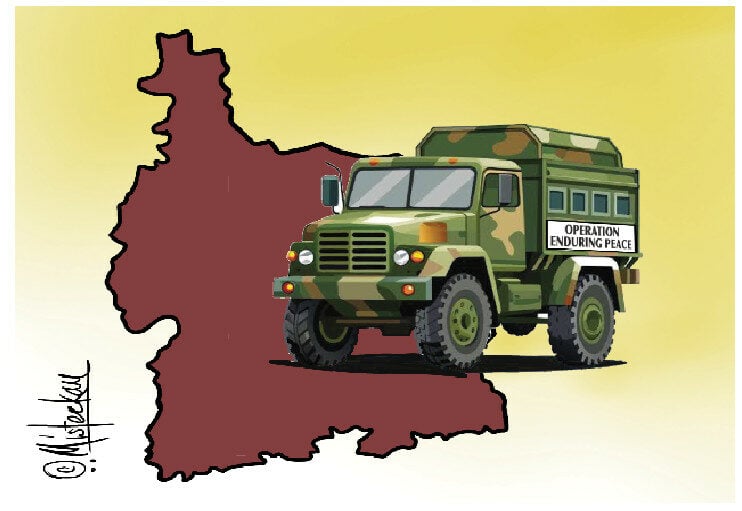Plateau State holds a special place in my heart. I began my professional career in Jos. During my stay in Jos, it was a pleasant experience. Interestingly, the state’s sobriquet is “Home of Peace and Tourism.” I experienced this first-hand. Since I left, a lot has changed. A lot of water has gone under the bridge. Five different military operations have been conducted from 2002 to date. In 2004, a state of emergency was declared in the state by former president Olusegun Obasanjo due to escalating tension between Muslims and Christians that led to loss of lives and destruction of properties.
The military in internal security operations
The police were overwhelmed as usual, and the probable solution was the intervention of the military to arrest the descent into anarchy. Military operations in Plateau state started with Operation Harmony in 2002 and ended in 2004. Operation Restore Peace held sway from 2004 to 2008. Operation Flush was instituted in 2009 and terminated in 2010. Operation Safe Haven began in 2010 and continued until recently, when it transformed to Operation Enduring Peace. These military operations give insight into the vulnerabilities of the Plateau, Benue and Nasarawa axis.
The recent rebranding of the joint military operations Operation Safe Haven to Operation Enduring Peace did not come as a surprise. Operation Safe Haven is one of the longest military operations in Nigeria, just a year shy of the military operations in the northeast. The Plateau, Benue, and Nasarawa axis has a long history of sectarian conflict. The 2001 Jos crisis was the precursor. It highlighted the suspicion between Muslims and Christians in the state and sparked the indigene versus settlers’ debate that has contributed significantly to the chaos that seemed to have defied all odds.
This period assessed the involvement of the military in internal security operations under a democratic setting, and was largely responsible for the backlash it has continually received from its operations in other parts of the country. This is understandable. The populace expects so much from the military. They want the military to prove its might. Interestingly, times have changed. We are in an era of asymmetric warfare. The era of unconventionalism and the battle between state and non-state actors. This is the mix.
It was not surprising when Prof. Chris Kwaja, Special Envoy on Peace and Security, to the Governor of Plateau state, declared that the presence of soldiers has not yielded positive results with the continued attacks and killings of innocent civilians in parts of the state. He called on the Federal Government to “consider withdrawing all military personnel deployed in flashpoints and replace them with Mobile Police Squads to ensure a more effective and responsive security strategy that prioritises the fight against asymmetrical warfare, which the MOPOL is conversant with.” This is uncharitable and defeats logic in my opinion. I can bet that Prof Kwaja knows better about asymmetric warfare than the position he canvassed.
The dynamics of military operations
The use of brute force cannot adequately address the conflict in Plateau State and environs because of the complexities involved. This explains why the military has continually rejigged its operations in the state since 2002. In asymmetric warfare, military strategies are not static. They evolve to accommodate the peculiarities of the time. And the recently launched Operation Enduring Peace is an example of the conformity to these dynamics. This, the Chief of Defence Staff, General Christopher Musa, stated. He said the “new operation is a rebranding of Operation Safe Haven, aimed to achieve lasting peace in the Joint Operations Area with the involvement of members of the affected communities.”
This is the new focus of Operation Enduring Peace, and I believe it would be an instant success. General Musa emphasized building trust with members of the communities. He said, “This operation is a new mindset that we want to create within the troops. We need to work with the communities. The communities must trust us.” This is a population-centric approach that draws from the war strategy of winning the hearts and minds. It focuses on building trust, understanding, and cooperation between military forces and the local population.
The local population is important
The renowned Counterinsurgency expert, David Galula, in his work “Counterinsurgency Warfare: Theory and Practice”, recommended a population-centric approach in counterinsurgency operations. He posited that “Effective counter-insurgency operations demand a blend of decisive military action and strategic political engagement, recognising that the ultimate goal is not merely to defeat an enemy on the battlefield, but to secure enduring stability and support among the local population.”
Prof CCC Osakwe corroborated this position in one of his notable works, “Nigeria’s Military Operations in the Lake Chad Basin” He stated that “in military operations like the one in the Lake Chad Basin, the military and civilian populations usually have justified and erroneous perceptions that often have the propensity to stymie an operation.” This is why military operations are always complex. There must be a deep understanding of the culture, traditions, and socio-economic conditions of the local population, and this doesn’t come on a platter, given the existing tension. This process takes time and considerable resources to achieve. It is a non-kinetic operation. Non-kinetic operations are psychological.
Unending fact-finding
I recognise the move made by the governor of Plateau state recently when he instituted a fact-finding committee on the incessant attacks on communities in the state to “conduct an in-depth assessment of the persistent security breaches, understand the root causes, and propose actionable recommendations for lasting peace, justice and stability in affected communities.” The fact-finding committee was also expected, amongst other things, to establish the identities of persons who perpetuated the attacks, and their possible motives and sponsors, and identify possible routes for bandits into the state and recommend measures to limit their access”. This is good. But not actionable. Fact-finding committees do not have the authority to implement their recommendations. This is mindful of the fact that most times, the implementation of the recommendations is susceptible to political considerations. The 1999 Oputa Panel and the 2014 Confab recommendations are very good examples.
Propaganda is a potent weapon in warfare
The birth of Operation Enduring Peace is commendable. The military high command must also communicate these changes in a language the local population understands through a sensitization campaign aimed at winning the hearts and minds. Such an initiative is an aspect of war propaganda that confers some level of advantage over adversaries. It is the battle for public opinion. To allow the adversary to control the narrative is dangerous. Asymmetric warfare is unconventional. Every little thing counts. For example, a simple act of deploying military doctors to primary healthcare centres in affected communities can win the trust of the local population. And it comes with its attendant benefits. The military should not hesitate to deploy this strategy in Operation Enduring Peace. I came across a quote that perfectly summarises my position. It says, ” The last stroke of the hammer breaks a stone. This doesn’t mean the first stroke is useless. Success is the result of continuous effort.”
– Ocheja, PhD, who specializes in the documentation of military histories of Nigeria and Africa, henceforth writes fortnightly





